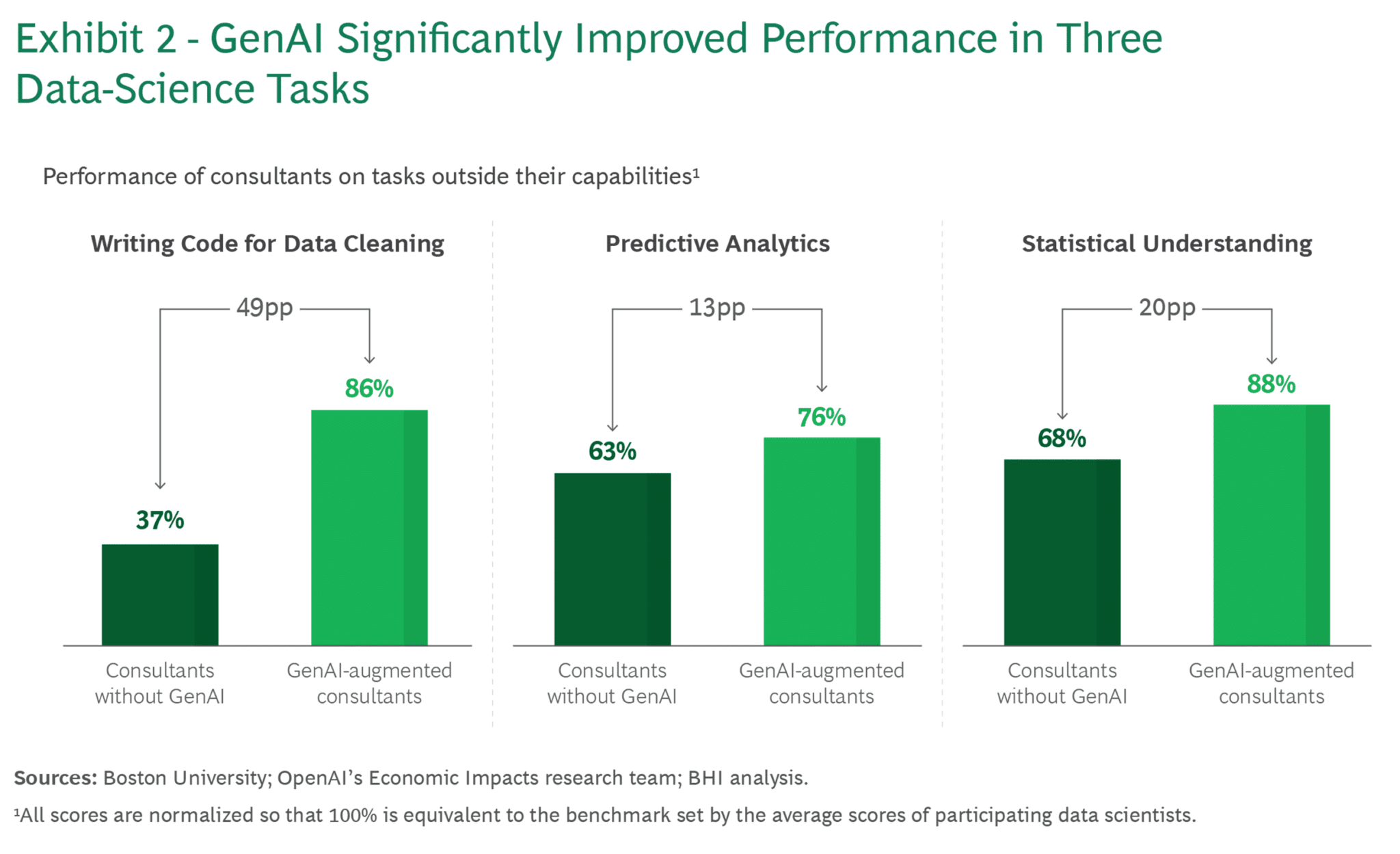Could HR leaders write code? Build a predictive model? Traditional thinking says no, but new research says this is the future when augmented by generative AI.
A recent project by BCG Henderson Institute, BCG X and Boston University’s Emma Wiles explored whether gen AI can help users—presumably including HR leaders—tackle tasks beyond their current skills.
In the experiment, 480 BCG consultants attempted challenging tasks typical of data scientists, like writing Python code and building predictive models using an AI tool. Their performance was compared with 44 data scientists who worked without AI.
The study, released Sept. 4, found that gen AI-augmented workers can handle tasks beyond their existing expertise, highlighting the need for HR leaders to rethink skill development. Participants using gen AI scored 86% of the data scientists’ benchmark, a 49-point improvement over those without AI. They also completed tasks about 10% faster than the data scientists.

Gen AI strategy as a ‘collective effort’
“Executives need to be ready for this future, redefining expertise and identifying the skills to grow and retain their talent for the long term,” writes Dan Sack, a BCG managing director and partner and co-author of the study.
A report from KPMG advisory services says that HR leaders must prepare for the workforce implications of gen AI-driven changes, such as this type of task-shifting potential. The authors say this strategy should be treated as an ongoing, organization-wide process.
KPMG advisors say that organizations should create a cohesive approach to workforce planning that leverages the potential of gen AI while being mindful of business objectives. This can be cultivated by fostering collaboration and buy-in across all leadership levels.
The BCG report suggests that providers of gen AI models should consider how their tools can better support learning and development. “Preparing for a gen AI-augmented workforce must be a shared effort, as our collective future relies on it,” according to the study’s authors.
Many analysts have predicted that gen AI will free up time—McKinsey reports that up to 30 percent of business activities could be automated by 2030. It’s thought-provoking to consider a workforce using gen AI to create output beyond an employee or department’s skillset. I expect that the most forward-thinking human resource leaders will be setting new standards for this evolution.
HR tech in action
- Oyster, a global employment platform for distributed teams, raised $59 million in Series D funding led by Silver Lake Waterman, with support from investors like Emergence Capital and Stripes. According to a release, the funds will help accelerate its platform, enhance compliance and improve talent attraction and retention for customers.
- Learning management company Skillsoft has introduced a risk-based approach to compliance training that allows organizations to tailor programs to individual needs, develop targeted risk management skills, and track changes in risky behaviors across their workforce.
- Workforce payroll and payments platform Papaya Global announced a four-week streamlined global payroll setup. Papaya’s solution caters to large multinational companies with both in-house and outsourced payroll teams. The announcement indicates this setup is available in time for 2025 strategic planning.
More from ‘Human Resource Executive’
- As technology evolves, talent acquisition leaders face a more tech-centric role. This Women in HR Tech keynote, Secrets from Top Tech-Savvy Talent Acquisition Leaders, sheds like on balancing tech and the human touch. The panelists will address challenges from AI and market shifts, offering actionable insights to help you adapt quickly. Register now.
- Previously reliant on spreadsheets, Gore Mutual Insurance struggled with data consistency. Meanwhile, the organization was in the throes of increasing its workforce and working to stabilize employee retention during the pandemic. See how this org adopted a tech-driven people analytics approach.
- Susan LaMonica, CHRO at Citizens, emphasizes the company’s commitment to supporting workers’ career journeys. She highlights the alignment of Citizens’ people strategy with its business strategy through a focus on culture, leadership and talent. Check out how LaMonica and her team make it happen.
The post How are HR leaders like data scientists? Ask gen AI, says a new study appeared first on HR Executive.
